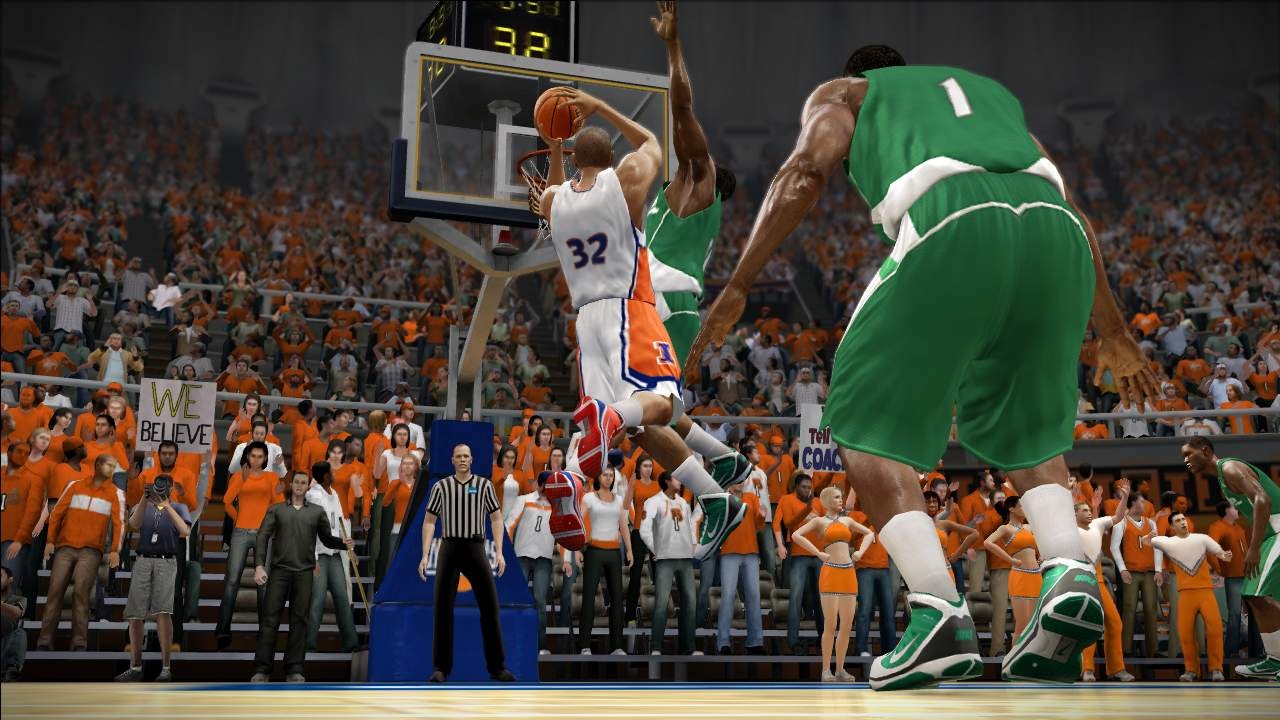Talking Hoops and MMA With Gus Johnson
We chat with CBS Sports play-by-play announcer Gus Johnson about his role in NCAA Basketball 10.

If there's one image CBS play-by-play announcer Gus Johnson remembers from his time recording play-by-play audio for EA Sports' NCAA Basketball 10, it's the seemingly never-ending scripts of lines he and partner Bill Raftery (himself a former color analyst for the College Hoops 2K series) had to get through during their time at EA's Vancouver studios. "We had stacks and stacks and stacks and stacks and stacks of paper that we had to get through. We had stacks of paper, man. I mean, I had to read every name in college basketball. Think about that. The last name[s]. Think about it!"
From there, Gus goes into "announcer mode," giving me an impromptu play-by-play performance: "Johnson for three! Peterson! Collinson! Bart! You know what I'm saying? Christiansen!"
Considering that Johnson had to read all those hundreds of names with the trademark enthusiasm that defines his announcing work--look up Gus Johnson on YouTube for a sampling of his infectious excitement at the end of games (as well as several fan-made tribute videos)--it made for long days at EA Sports. "You know, you could only go for a couple of hours because your voice starts getting tired."

However, "tired" doesn't seem to be a well-defined term in Gus Johnson's dictionary. In addition to calling college basketball and football games for CBS (GameSpot's parent company), he works as a radio and television announcer for the New York Knicks, as well as calling boxing for Showtime. He has also added mixed martial arts to his resume as a ring announcer for the now-defunct EliteXC promotion and, more recently, Strikeforce. He has even been taking jiu-jitsu in order to sharpen up his MMA playcalling as I found out in my phone conversation with him yesterday.
GameSpot: You've called so many sports over the years that it seems like video games were just a matter of time for you. How did you get involved with EA Sports?
Gus Johnson: Well, I guess CBS and EA had decided to come together, and it's a big coup for CBS to be able to have their graphics and their whole CBS style as part of [NCAA Basketball 10]. They came together and they decided that, and I guess they were looking around and--to see who was available and, you know, I guess the big guys weren't available. So, they came to me and they said, "Hey, would you like to do this?" And I said, "Sure man, that'd be cool."
And that's how it happened. I went on out to Vancouver [home to EA Canada], and we got it done.
GS: Is this your first video game experience?
GJ: As a broadcaster, yes.
GS: What was your experience like? I've talked to other broadcasters before, and some feel it's a bit strange to be calling a game that isn't there.
GJ: You know what? I just thought it was fun. We just had a good time with it. I mean, we were sitting in a room in a studio, at a table with a couple of mics, and that's it. I had to read a bunch of different lines, almost--we read every line imaginable in a basketball game. [laughs] And we had to do it with energy, enthusiasm.
GS: Were you there with Bill Raftery?
GJ:Mm-hmm.
GS: He's got video game playcalling experience [on the 2K Sports College Hoops series]. Did he have any advice for you?
GJ: Oh yeah, he just said relax and just, like, get into it--it's like acting. I felt like Denzel Washington or something. I was an actor. Because there's nothing in front of you, there's no sound, there's no game, but, you know, they have a bunch of different lines that you read.
Our producer--he kept feeding us lines and we kept reading them with enthusiasm, different inflections, and it was a lot of fun. Because you have to, in your mind, see that moment that's happening, and depending on how he wants you to read it, you have to match your energy level to that moment. So, I thought that it was a good learning experience as well, to go out there and try to make sure that it felt real for the fans that are playing the games.
GS: Well, few guys on the mic have more energy than you, so I'm wondering if you were just in the middle of that studio, standing up and screaming into the mic? Did you feel self-conscious?
GJ: No, I didn't feel self-conscious at all because that's what I do and I had to give them my style. Sometimes I would stand and yell or stand or use my hands to get excited about something or describe a play or, you know. I tried to just mimic how I call the game on a regular basis in that studio. That's why it was fun because you had to use your imagination.
GS: Did you know that there was going to be both CBS- and ESPN-style presentation in this game? Did they explain to you how that would work?
GJ: Yeah, they explained it. I mean, for the fan--for the gamer--it's the best of both worlds. You got Brad Nessler and Dick Vitale, and then you got me and Raf. So, you got the ESPN style, then you got the CBS style. I mean, that's pretty cool, I think.
GS: I'm wondering if you had a chance this year or maybe for next year, if you can take some potshots at the ESPN guys. You know, put them in their place, let them know where CBS is at.
GJ: Ah, man, shucks, Dick Vitale and Brad Nessler, are you crazy?
GS: Yeah, they're good.
GJ: Brad Nessler is actually my favorite broadcaster.
GS:Really?
GJ: Yeah, man, I've been listening to him for years. He's great. And Dick Vitale, I mean, I'm from Detroit, I grew up watching him coach the [University of Detroit] Titans and being a Titan toddler and all that kind of stuff man. So those guys are the best.
GS: I want to ask you just in general about your career. You've called so many different kinds of sports, and I'm wondering how you prepare for all these different kinds of games.
GJ: Well you figure out a way. Everybody has their own way to prepare, and the teams and the organizations that I work for do such a good job of sending you information and putting you in the best possible situation to be fully aware of everything that's going on with the players or the fighters.
So the organizations do a great job and I have different ways of preparing. I don't really prepare the same way all the time. I think what I've been doing in the last few years--that I think has been very helpful for me in my style--is to really talk to people. Talk to people about more than the obvious. Try to get into what these guys are feeling and what they're thinking and how their lives are going, as opposed to just the cookie-cutter questions.
And I think that allows us to tell some good stories, and I like that a lot. So but there's so much information, as long as you just sit there and dig into it, you can always come out with some good stuff and be able to tell some good stories on these athletes.
GS: I noticed that you've also started doing some mixed martial arts playcalling. What's it like calling MMA versus calling, say, boxing or something like that?
GJ: Well, MMA is so complicated. You know, there's the stand-up side of the fight and then there's the ground fighting. And the stand-up is different than in boxing because of things like Muay Thai and elbow strikes and the knee strikes and the Thai plums. It makes it really interesting.
And then when the fight goes to the ground, that's when it really gets bizarre with, you know, the jiu-jitsu and all the different moves that can be utilized. Pulling a guy into your guard, you see somebody fighting on their backs, they're pulling their opponent into their guard to set him up for all different kinds of submissions.
And I think that's why MMA is really intriguing to me. Because it's such a complicated sport and these athletes are really good athletes and they're really nice people and they work hard, train hard to be the best. And it's rough, it's violent.
GS: When you started doing MMA fights, did you do sort of a crash course watching a lot of fights? Or had you been following it before you started calling it?
GJ: Oh, yeah, I had to. I started taking jiu-jitsu.
GS: Oh, really?
GJ: Yeah, so I've been taking jiu-jitsu since I started, and actually it was with the EliteXC at first.
GS: Right, right of course, yeah.
GJ: Right with Kimbo Slice and all those cats. So, I started taking jiu-jitsu at the Renzo Gracie Academy, and I got myself a coach, and it's funny man, MMA has already improved my life. Taking jiu-jitsu, all of a sudden I got in incredible shape, you know. My body got together in good shape, you know, in my forties and learning a lot about the sport and I love it.
I did take a crash course, and I'm still learning. It's not an easy sport to learn. Not many people know it, I mean really know it. So, when I go in there, after I've called the show, I get critiqued by the black belts at the Gracie Academy. They'd tell me what I need to know and what I need to work on.
GS: I would imagine actually doing the sport would give you just the sort of insight that you just don't get even from watching tons of matches.
GJ: Oh yeah, there's no doubt about it because you see how it works. Everything about MMA, especially when the fight goes to the ground, is about hip movement. Can you use your hips to escape and explode and to change your angles? That's really what the sport is about. Especially when you see the guys get on their back, how they can hip escape, explode their hips out to replace a leg and go for an arm bar. Or to be able to use their hips to explode up, to open their legs, to grab, use their legs to wrap around their opponent, to go for a, you know, a triangle choke or something like that.
So, that's what we do a lot in my class. I'm hip escaping up and down the floor, up and down the floor, so much that it's like wax on, wax off. Remember in The Karate Kid?
GS: Yeah, absolutely.
GJ: It's like [wax on, wax off]. But it's a great opportunity. I'm learning, I'm continuing to learn a lot about the sport by having a chance to train.
GS: All right, well, last question. We talked earlier about your extreme energy when you're calling games. You're known for big calls in March Madness. I'm wondering if you've seen the YouTube tribute videos to you.
GJ: You know what? I've seen a couple of them, I saw a couple of them a while back. Sometimes I get so self-conscious of that stuff. I think it's really cool that the kids go out and do all that. I'm not a big computer guy, that's the irony in this. I'm not a big computer guy.
But I've seen some of that stuff man, and I think it's wonderful. I think that the kids who put that stuff together--I'm really just overwhelmed by some of the positive feedback that I've gotten on my work, and I'm just happy that I can have a little impact on the fans of basketball and the sports that I call.
GS: The way I look at it is that there are bad YouTube tribute videos, the ones that make fun of people, and then there are good ones, and all the ones I've seen of you have been good. So that must mean you're doing a good job.
GJ: I hope so man, I hope so. [laughs]
GS: Thanks for your time, Gus.
Got a news tip or want to contact us directly? Email news@gamespot.com




Join the conversation